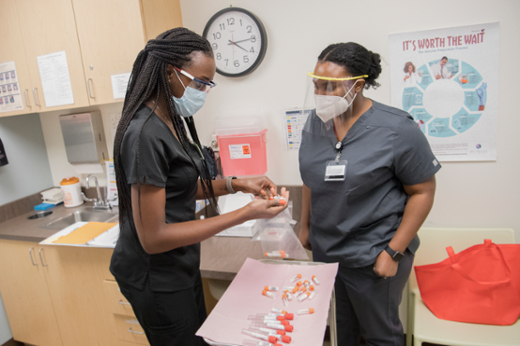Emory University has joined forces with collaborators nationwide to form the Advancing Clinical Trials at the Point of Care (ACT@POC) Coalition to improve the quality and timeliness of evidence about the effectiveness of therapeutics. The coalition will achieve this by engaging a diverse group of patients and providers in clinical trials and by developing digital health tools that make clinical trials simpler to run and more accessible to patients.
Currently, the complexity and cost of traditional clinical trials pose obstacles to patient and provider participation, identification of effective treatments for diseases, and the acceleration of new clinical insights and knowledge. This multi-stakeholder coalition aims to drive implementation of large-scale clinical trials at the community level—in the doctor’s offices and care facilities where most of the U.S. population receives care.
Emory has long been a national leader in clinical trials for vaccines and therapeutic treatments. By joining ACT@POC, Emory further emphasizes its commitment to conduct relevant and timely clinical trials to help solve the world’s biggest health issues.
“We believe the sweet spot for testing of repurposed drugs lies in community studies. The railroad tracks which this initiative will lay down will be critical for unleashing the full potential of repurposed drugs and other interventions, which are often not developed clinically because of a lack of financial incentive,” says Vikas P. Sukhatme MD, ScD, founding director of the Emory Morningside Center for Innovative and Affordable Medicine and dean of the Emory University School of Medicine, and Vidula V. Sukhatme, MS, co-founder of the Morningside Center and CEO of GlobalCures.
The consequences of inefficient, low-value COVID-19-related clinical research made the need for a coalition to support inclusive and efficient clinical trials evident. For example, one analysis found that of 2,610 trials of existing drugs repurposed as COVID-19 therapeutics, only five percent had sufficient enrollment and key design features to yield actionable evidence to combat COVID-19. Further, only a tiny fraction of Americans diagnosed with COVID-19 participated in those trials.
The coalition’s practical agenda and action steps aim to substantially augment the evidence generation capacity of the current clinical trial enterprise by working with patient groups, community hospitals and health centers, medical practices, research organizations, and biotechnology companies. In its work, the coalition will target:
- Engaging clinicians in a broader range of care settings
- Developing and adopting tools that enable straightforward data collection
- Collaborating with clinical trial design leaders, regulators, funders, and other stakeholders to assure that clinical trial design features are fit for purpose
- Enrolling diverse trial participants for broader participation in effective frontline trials
- Addressing unmet medical needs by reaching a critical mass of participation in existing and new clinical trials
- Improving technology supports and capabilities to conduct such studies over time
Founding members of the coalition include: Duke-Margolis Center for Health Policy, MITRE, Cures Drug Repurposing Collaboratory (C-Path + FDA), Duke University Health System, Emory Morningside Center for Innovative and Affordable Medicine, Intermountain Healthcare, Mayo Clinic, University of California—Irvine, and The Broad Institute. Its growing membership will include health systems, community-based care organizations, health research organizations, and other collaborators.

